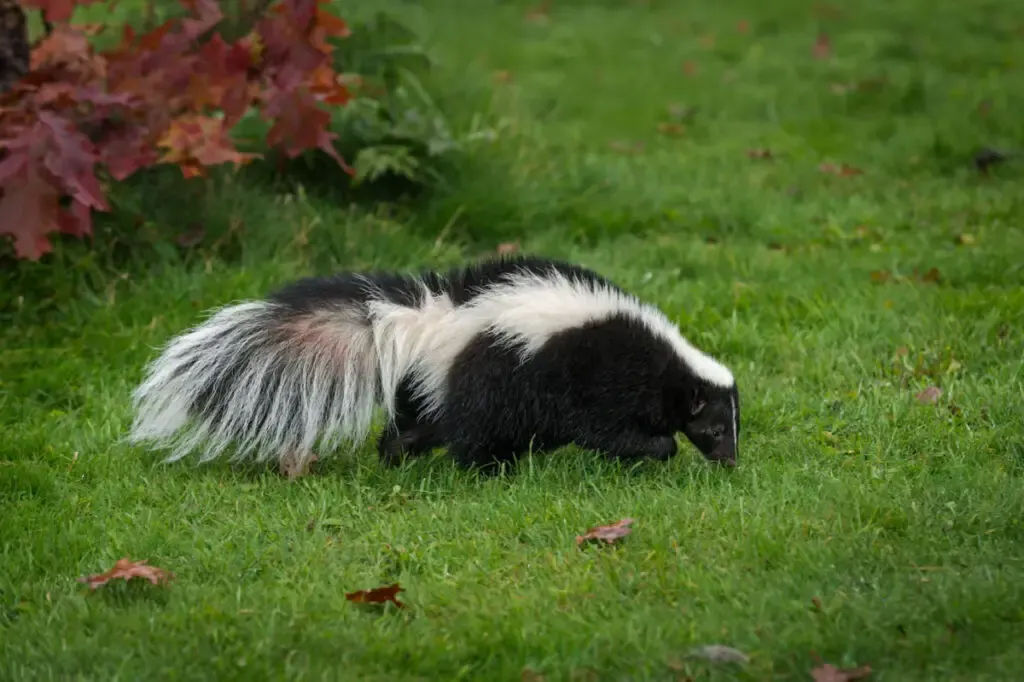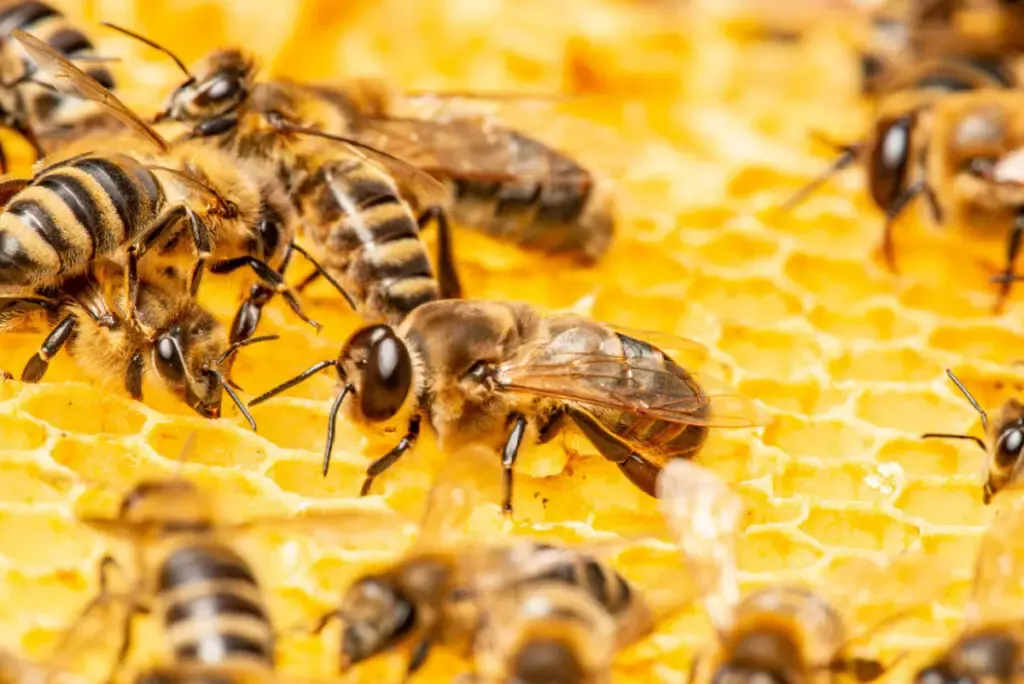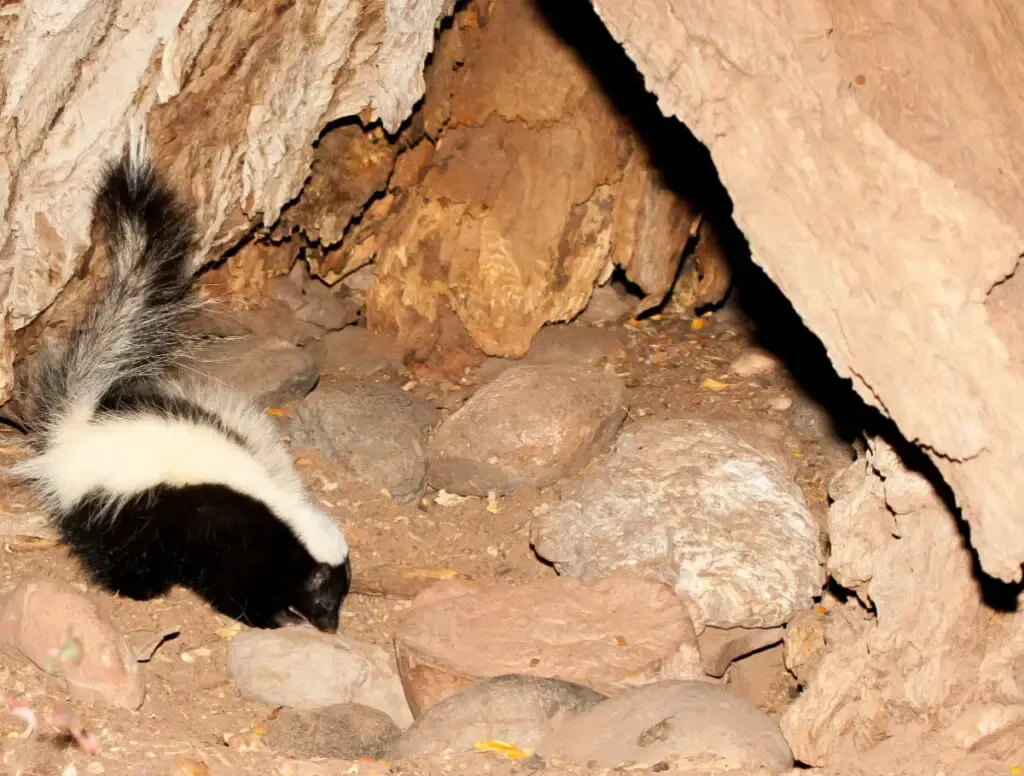There are few creatures more frightening than an alarmed skunk and they barely break a foot in height. The pungent pests can be smelled from up to twenty miles off after they spray and will happily go after anything from small rodents to trash bags: they have a varied and eclectic omnivorous diet.
Being the opportunists that they are, will skunks go after bees?
Given the opportunity, skunks will eat bees.
These clever scavengers will eat anything edible and within nibbling distance. They actually have a very clever method of making sure that the bees come out to aggressively greet them that is unusually sharp for the capable critter.

In this article, we will go into more detail about why skunks go after bees, how to keep them away from hives, and why exactly they are so nonchalant about getting stung a few dozen times.
Table of Contents
Why and How Skunks Eat Bees
Skunks are natural scavengers that will eat anything they can get their paws on, even if it is at the detriment of their immediate wellbeing.
A skunk will start by slashing at the hive with its claws, which will bring out a bunch of concerned bees trying to figure out what is damaging their hive. As they do this, the skunk will swat at them which will render them immobile long enough for the skunk to start eating the bees.
Skunks eat bees like most people eat sunflower seeds, they chew out all the important insect fluids, then dispose of the more undesirable parts of the bee that are more inedible.
Skunks seem to be able to bear the pain of bee stings as well, with researchers finding a skunk with sixty-five bee stings on the inner and outer part of the unlucky animal’s face.
While most creatures would learn from their first encounter, skunks typically will go back for seconds later if the hive is still around.
The reason skunks go after bees so adamantly is because, unlike most animals, the skunk stays active during the winter months. This means that it will have to change its diet with the seasons and when beehives are active, they serve a valuable need for the skunk in the form of protein.
So just like a human will eat chicken and fish, a skunk will nibble on bees and mice to get their fix.

How to Discourage Skunks From Eating Bees
Whether you are a budding beekeeper or a concerned homeowner who has found evidence of a new neighbor in your front lawn, we’ve got you covered.
Owners of apiaries will tell you as well as I that a skunk goes from an unwanted pest to an active predator when you keep bees within swatting distance. Follow these helpful tips to make sure that your pet skunk or colony of bees never gets harmed again!
Light Up the Place
Skunks have very poor vision and are naturally nocturnal creatures. So when you shine down a bunch of bright lights they are less likely to go near the area due to their natural distaste for light exposure.
When utilizing this it is essential that the lights you use do not upset the bees. Certain lights will affect their night cycle and could produce unwanted effects on your bees.

Keep the Bees Above Ground
By elevating your apiary you stand a much better chance at keeping out unwanted critters who can’t reach their usual dinner.
Skunks are notoriously sketchy climbers and keeping beehives at least three feet off the ground will usually do the trick in keeping out skunks.
It’s also important that you remove any easily climbable objects near the apiary as skunks can and will climb certain things like wire fencing or objects with easy grasps for their claws.
Keep External Trash to a Minimum
Anyone who lives in the country knows the pain of a trash bag that has been ripped apart across their front lawn. This is important for more than just skunks, it will keep out raccoons, coyotes, bears, and a number of other unwanted animals.
By keeping your trash sealed away somewhere out of reach and out of sight it will give scavengers like skunks very little reason to wander into your neck of the woods in the first place.

Good, Dug-in Fencing
Fences are a great way to keep out skunks, though if you are going to embark on this pricey adventure, make sure you get the proper fencing. Skunks are excellent at burrowing and a fence that isn’t well into the ground will be easily overcome by most of these pesky predators.
Keeping a fenced perimeter around your apiaries that is firmly planted into the ground will help prevent burrowing skunks from getting into your yard.
Conclusion
Scavengers are one of the few types of animals that have benefitted from the advancement in society. They can now find food sources from trash cans, open garages, and easily accessible beehives.
Skunks are located in all fifty states and are relentless in their pursuit of food, especially when it comes to bees. Hopefully, with this information, you can either be better informed or better at preventing the curious critters from ransacking your yard!
